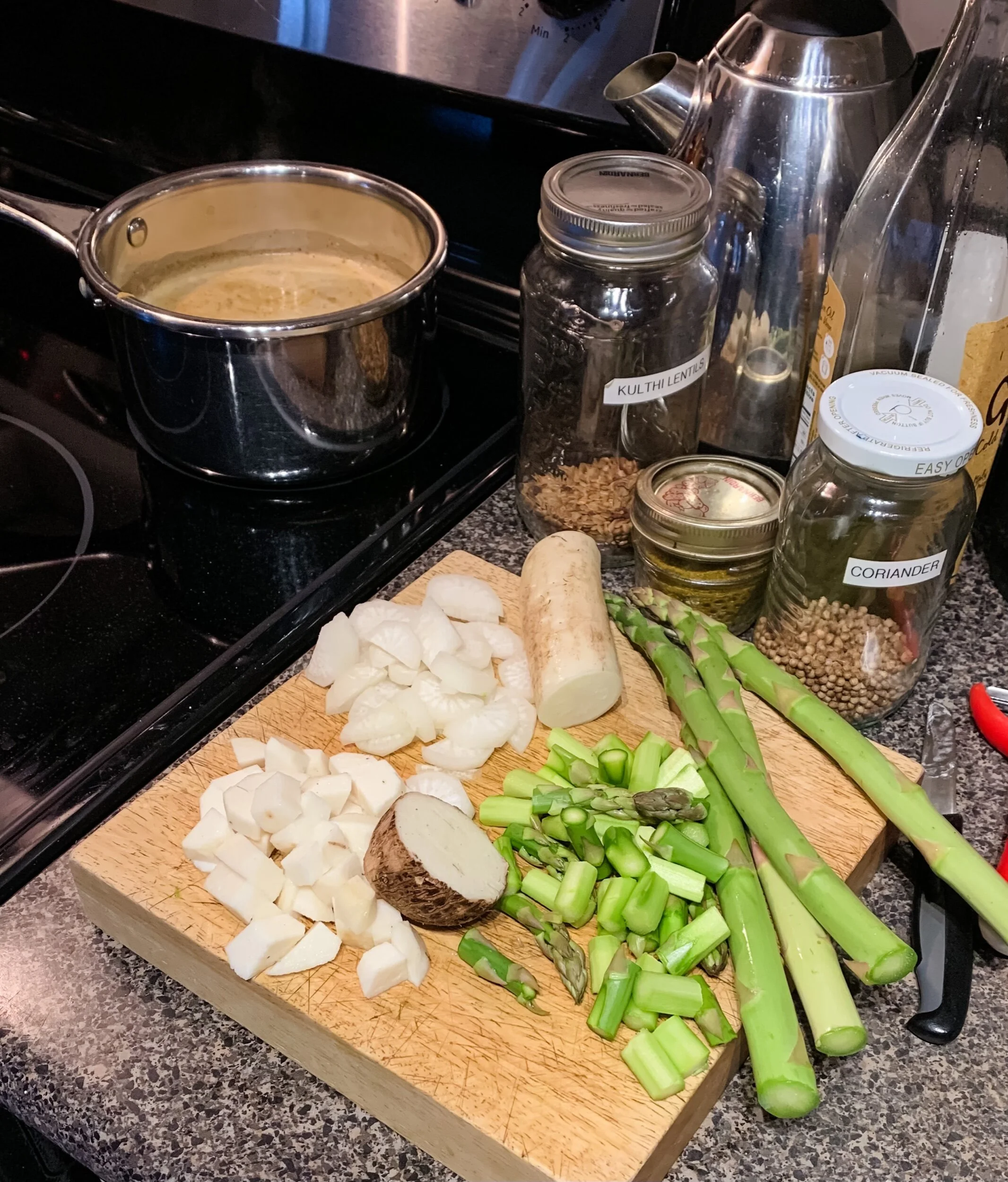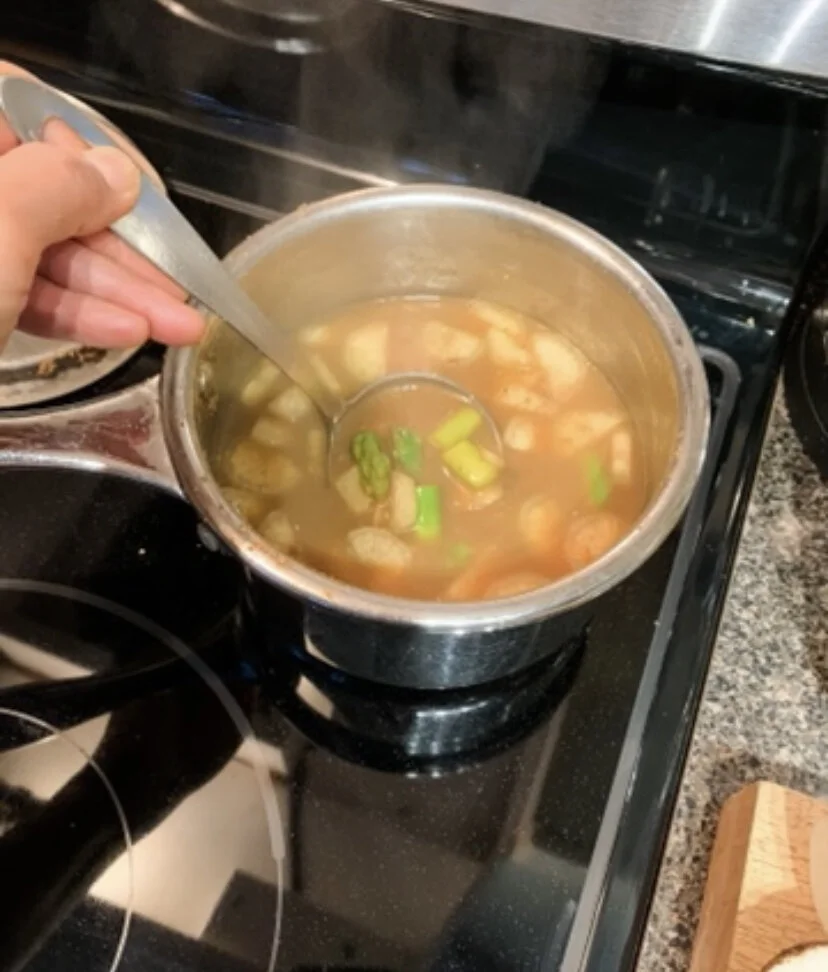Asparagus Kulthi Lentil Soup
Hi I’m Evangeline! Welcome to my blog. I am mom and lover of all things health and wellness. By profession- a Registered Massage Therapist and Yoga & Ayurveda consultant. I started this blog back in the early days of Covid19 as a way to stay in touch with my clients, and it’s grown into a space to share what I love most. Here you’ll find health tips and nourishing recipes I make for my family, sprinkled with Ayurveda and Yoga wisdom. My hope is that these posts inspire you to care for yourself in small, joyful ways and feel a little more balanced in everyday life.
Asparagus are in season! Having a naturally short harvesting season in the spring between late-April to mid June, asparagus is high in antioxidants, minerals and Vitamin K, the latter critical for building strong bones.
Asparagus is perfectly paired here with white daikon radish’s slight pungent taste. Both are seen in ancient cultures as having medicinal qualities and in Ayurveda recognized as helping cleanse the kidneys. I have been having two soups similar to this one for several years now as prescribed by my Ayurvedic doctor. I decided to create this one soup, combining the therapeutic elements I had to include: kulthi, asparagus, white daikon radish, coriander, and a binding type food, like taro or barley. I have this soup occasionally throughout the year. I also make a version of this for the family with other types of lentils and add in zucchini or leafy greens, with different spices for variety.
R -L asparagus, eddo/small taro, white daikon radish
Ayurvedic Profile of Spices in the Asparagus Lentil Soup Recipe
Asparagus - cleans the kidneys
White Daikon Radish - also cleans the kidneys; shaped like a carrot but white
*Taro - binds toxins and directs them to the bowels; also called eddo; has a brown hair like skin and white inside like a potato
**Kulthi Lentil- breaks down micro-crystals that cause gall stones, kidney stones, gout; caution when using if you have a history of large stones
Coriander - brings toxins and heavy metals to the kidneys for elimination
Ajwain - clears ama (improperly digested food); stimulates digestion; caution if you have hyperacidity
*Other binders include barley grain, okra arrowroot powder, tapioca powder (extracted from cassava), eddo- smaller version of taro
**Kulthi is a very hard lentil and actually grows on hard rocky surfaces; also known as horse gram. Use under supervision from a health professional.
Asparagus Kulthi Lentil Soup with Taro and White Daikon Radish
Asparagus Kulthi Lentil Soup
Servings 2 - 3
Prep Time 10 minutes
Cook Time 40 minutes
Ingredients
3 cups spring water or vegetable broth
¼ cup kulthi lentils
1 - 2 small taros, peeled and cubed, or ¼ cup rinsed barley
6 asparagus spears cut in 1 inch pieces
3-4 inch piece medium white daikon radish, cut in half rounds
1 tsp ground coriander
½ tsp ground fennel
¼ tsp ground cumin
¼ tsp turmeric
¼ tsp ground black peppercorns
¼ tsp ajwain
Drizzle of olive oil
Squirt of lime juice before serving
Soma salt to taste - If you are having this soup as part of a detox, avoid adding salt.
Instructions
Grind kulthi in a coffee grinder.
Cook lentils in water first for 5 minutes in medium high heat. Remove the froth that rises to the surface. Add spices and cover with a lid, turn stove down to low and cook for another 30 minutes, stirring occasionally. If you are substituting barley as a binder instead of taro, add barley with the kulthi.
Add taro and white daikon and put lid back on and cook for another 5 minutes.
Then finally add asparagus and cook another 5 minutes.
Drizzle olive oil and stir.
Squirt some lime juice before serving.
Enjoy!
A variation with red lentils. Red lentils cook faster than kulthi at 15 minutes in Step #2.
References
https://www.ncbi.nlm.nih.gov/pmc/articles/PMC7022954/
https://www.healthline.com/nutrition/asparagus-benefits#TOC_TITLE_HDR_3
Vaidya R. K. Mishra- Notes from Shaka Vansiya Ayurveda Courses, Practicum, Conferences and Lectures 2003-2015



